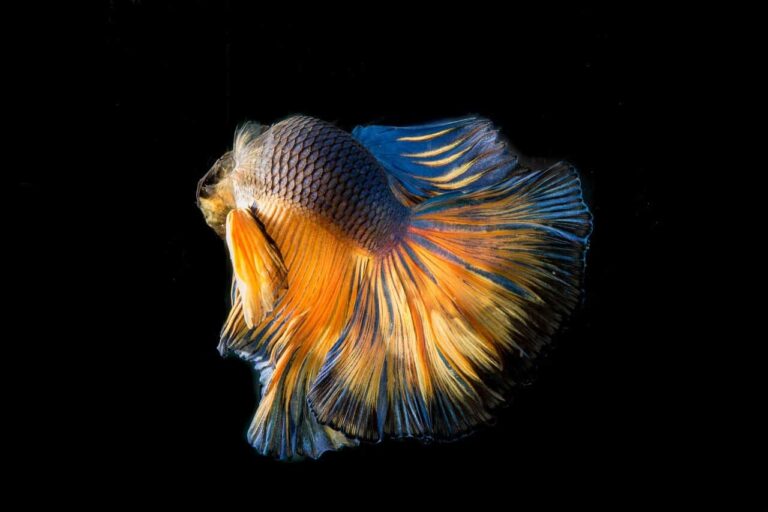Since betta fish are hyperactive, the hobbyists and new fishkeepers will be less likely to see their betta sleeping. Naturally, many betta fish owners keep asking the question, ‘Do betta fish sleep?” They also wonder when and how do these beautiful fish sleep and how to tell if these are really sleeping or not.
Let’s put it simply.
All fish need sleep. Since betta too is a fish, it needs proper sleeping. And of course, no matter how hyperactive Bettas seem to be, they also sleep for a certain period of time.
So, now let’s directly jump to the fact to identify their sleeping sign, when and how they sleep as well as factors that might affect their sleeping routine.
Do Betta Fish Really Sleep?
Betta fish like you and me, sleep whenever they feel dizzy, or love taking rest. However, betta has a very different sleeping pattern, unlike humans and other fishes even.
The most distinctive sleeping pattern of the bettas is that these are light sleepers.
It means betta can get awake for the dormant state with the slightest of sound around their living tank. This is a sharp contrast from humans who are mostly heavy sleepers and won’t wake up with a light earthquake (at least I am).
But why are the bettas so light sleepers?
Well, the underlying answer depends on the instinct of bettas and how they have been rapidly developed as a pet breed.
To speak the truth, bettas are a relatively new pet fish bred and came into our home only a few decades ago.

Since these are newly welcomed at the residential condition with a cozy environment, their natural habitat hasn’t gone entirely.
And the instinct of betta tells them to remain alert all the time. Without being vigilant, the fish could lose its territory to another betta or can be food for the bigger predators. Therefore, due to the survival instinct, a betta is light sleepers and wake up with the slightest movement around them.
Since they are yet adapting to the comfortable home conditions, their fear of losing territory or being engulfed hasn’t changed again.
So, even in the fish tank, they don’t feel secured and hence, get up with a minimum of movement.
However, the scenario is changing rapidly.
And bettas living in a fish tank for 1-2 or more years are reported to have a sound sleep for a long, really long hours.
Another distinctive sleeping pattern of the bettas is that these bred love sleeping at night when there’s no light around. It makes them a suitable bedroom companion for the fish lovers.
However, just like humans, some lazy betta also loves napping during the daytime. Especially in the aquarium where they don’t need to fight for territorial domination and get natural foods.
How to Tell If a Betta Is Sleeping?
Betta’s sleeping characteristics are weird enough to make you scary.
Especially if you are petting these beautiful and lovely fish for the first time, chances are like that your heart will be right into your mouth when you see the betta floating around the water motionless- as if it were dead.
Don’t get worried- it is a typical sleeping posture of the betta.
Just scroll through the following section, and you will know how to determine whether your loving fish is sleeping or not.
The easiest way to tell bettas are sleeping is to look at their mouth. You will notice that the betta is taking oxygen through the mouth and exhaling water through the gills, a sign that the betta is sleeping and not dead.
However, the gill and mouth movement of the betta is way slower than when it is awake. Don’t get tensed when you see it since betta like human needs less breathing when they sleep. As a result, these fish also require less movement of the gills that are linked directly with the breath.
And it’s perfect.
Another noticeable change might be in their color patterns. Some fishes change color during sleep time, and betta is one of them. It prominently loses the intensity during the snooze, particularly.
According to fish experts, betta loses color during sleep as part of their natural defense since it makes them much harder to find.
However, be assured that the pale color of the betta is only apparent when it sleeps. As soon as it wakes up, the color will turn into the regular vivid, and vibrant color pattern for what the betta is known and loved. If not then it is a symptom of a stressed betta.
The final assurance of betta is sleeping and not dead is to see its sleeping position. Most betta will sleep like a cat does and will even sleep vertically.
However, when you find a sleeping betta just don’t do the followings:
- Turn on the light
- Tapping on the aquarium glass
- Poking the betta
Imagine, someone, waking you up unnecessarily at the middle of the night, how would you feel? Disgusted, right?
Your betta has the same feeling.
Betta fish sleep location
You might already know how weird the sleeping patterns are of a betta. And just like the sleeping pattern, their sleeping places are even stranger than you can think of in reality.
For instance, sleep everywhere, literally.
Yes, I have two bettas for the last one and a half years, and I have found them sleeping comfortably everywhere. The location ranges from close to filter intake, behind the water heater, and even on the ornamental plants.
However, the most freaking sleeping position is the floating vertically and head buried underneath the gravel.
To speak the truth, the first time I saw my bettas floating motionless in the water, it brought an instant hue and cried in me- I considered it dead!
And even with the one and half years of betta petting experience, I never forget checking the two species whenever I see them floating around the water.
And the last weird position to find betta sleeping is out of the water.
Yes, it’s true.
You will most likely find betta right on the plant leave if you have a plant in the water and its leaves hanging directly above the water level.
It just seems like that bettas are the master at finding the most unthinkable sleeping location and position for them.
Precarious!
Why Is My Betta Sleeping too Much?
During my petting career, I have come across a lot of people who are worried about their betta sleeping more than the regular cycle. It can happen for several reasons.
But before we venture deep into the cause of betta sleeping more, we need to know the regular sleeping cycle of a betta.
Spoiler- a betta will sleep around six to eight hours on average.
However, just like we humans, some bettas may have developed a more or less time pattern for snoozing and sleep. So, when you first bring a betta, observe its sleeping time and then make an average of its standard sleeping time.
It gives you a better idea of its health too.
So, now, let us see why do betta sleep more in the fish tank or aquarium.
- The dark tank inside: Betta love sleeping in a dark surrounding. So, their excess sleeping is an indication that the tank is too dark. You should adjust the lighting to avoid such conditions.
- A boring and non-decorated tank: Boredom can cause excess snoozing as well. It happens if the container is too small or lacks decorative items that betta can play with. You should seriously consider adding a mirror and increase the tank size to make the fish active.
- Inappropriate tank temperature: The ideal tank temperature for the betta is between 78-82°F (26-28°C). If the tank temperature goes beyond the range, it makes the betta lethargic that causes excess sleep.
- A sick betta: The most common reason for betta sleeping more than its regular time is its sickness. Just as you want to be on the bed when you are unwell, bettas do the same. The most common betta sicknesses are:
| Sickness/Symptoms | Reason |
| Fin and tail rot | Bacterial and fungal attack |
| Velvet | A parasite that discolors the fish |
| Popeye | Viral infection in the eyes and causing swelling |
| Mouth fungus | Fungal attack |
| Dropsy | Kidney failure due to fluidity |
Another reason for betta sleeping more than the anticipated cycle is that these are getting old. When bettas grow older, they become slower. They love sleeping instead of roaming around, especially when food is abundant in the tank.
Why Does My Betta Doesn’t Sleep?
While excess sleeping of the betta is a typical attitude of them, the opposite isn’t rare too. It means many bettas will have a lesser sleep time or no sleep at all.
These may happen for the following reasons:
- Bettas hate tank mates since these are highly territorial fish species. So, with other bettas, they feel insecure and reduces sleep time to protect their territory.
- If the tank inside is too bright and continuously comes under the direct lighting, bettas will become less likely to sleep. Bettas need absolute darkness for a night of proper sleep.
How to ensure a proper sleeping condition for betta
If you own a betta, you should already know that a well-rested betta is more likely to live long and happily. So, you will long for ensuring a proper sleeping condition inside the betta tank.
Fortunately, you won’t need to move a mountain for it.
Instead, the following easy to do steps are FINE.
Proper lighting
Bettas sleep with their eyes open. So, any external lighting hampers their napping schedule. Thus, you should ensure that the fish tank is away from the light in the night. It will boost the sleeping time of the fish.
Proper temperature
Bettas love when the water temperature is around 78-82°F. Use a thermometer ardently to measure the water temperature regularly and keep it in the optimal state. Use a heater if necessary.
Creating shades
At daytime, bettas will nap if they find a proper shading. You can achieve the shade with multiple alternatives:
- Position the fish tank in a shady or darker place.
- Use tall live plants for decorative purposes and also to create some shades.
- You may also prefer small tunnels and caves inside the tank to provide additional shading.
The Bottom Line
Although all betta sleep, you might rarely find them asleep. It happens since the fish sleeps with eyes wide open.
However, their precarious sleeping positions are often as frightening as if they are dead. So, the next time you find them in such a weird condition, carefully check the mouth and gills to find out the reality.
And finally, for the longevity of your favorite and colorful betta, manage the tank interior with proper crafting for an ideal sleeping condition.






